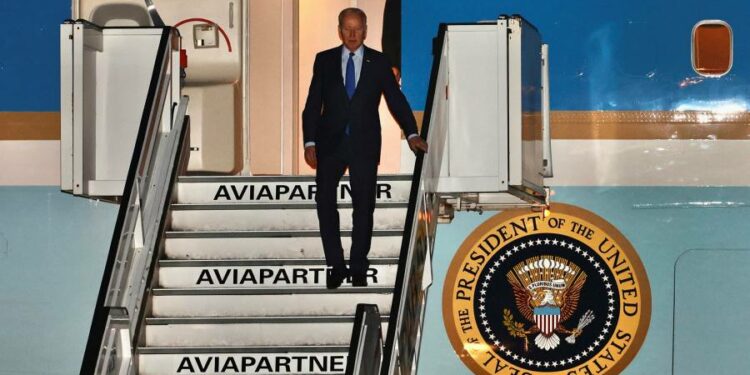US stocks rose, European gas prices advanced and government bonds remained under pressure from inflation fears as Joe Biden met Nato leaders to discuss their response to Russia’s invasion of Ukraine.
Wall Street’s S&P 500 share index gained 0.5 per cent, while the technology-focused Nasdaq Composite added 0.3 per cent, as traders switched money out of a global bond market that is undergoing its deepest downturn since at least 1990.
The S&P has climbed almost 6 per cent above its closing level of February 23, the day before Vladimir Putin launched Russia’s invasion of its neighbour.
Equity markets were showing “a remarkable level of complacency”, said Unigestion investment manager Olivier Marciot, arguing that “it is hard to see how corporate earnings can be maintained alongside higher inflation and lower economic growth”.
“There’s a clear divergence between the bond guys and the equity guys,” he said. “I think the bond guys have it right.”
Europe’s regional Stoxx 600 index, which is more than 7 per cent lower for the year and traded flat on Thursday, has erased all of its losses since Moscow’s incursion began.
At the same time, US, eurozone and UK government bond prices continued to fall as concerns about persistently high global inflation — stoked by possible further sanctions on Russian energy — reduced the appeal of the fixed-income paying securities.
The yield on the 10-year US Treasury note, which underpins global financing costs and moves inversely to its price, rose 0.04 percentage points to 2.37 per cent, close to its highest level since May 2019.
US President Biden met Nato heads of state on Thursday and forged an agreement to step up preparations for potential chemical and nuclear weapon threats, while investors were awaiting a response from EU leaders on potential blocks to Russian fossil fuel imports at a summit starting later in the day.
German Chancellor Olaf Scholz has warned that banning Russian energy “would mean plunging our country and the whole of Europe into a recession”. Germany imports a third of its oil from Russia and more than half of its gas and coal. Consumer price inflation in the eurozone hit a record 5.8 per cent in February, with economists expecting it to rise further.
For financial markets, the best EU summit outcome would be “a fiscal response at the top European level,” to fund assistance for businesses and households’ higher energy costs, said Monica Defend, head of the Amundi Institute.
Brent crude oil wavered at just below $121 a barrel, now up around a quarter since February 23. The benchmark could exceed $200 this year, traders warned at a Financial Times event in Switzerland.
Futures tied to Europe’s wholesale gas price added 7 per cent to €121 per megawatt hour, having topped €130 on Wednesday after Putin, Russia’s president, said “unfriendly” nations should pay for Russian gas in roubles, injecting doubt into existing supply deals. Prices are almost seven times higher than a year ago.
The yield on Germany’s 10-year Bund rose 0.04 per cent to 0.52 per cent, close to its highest level since October 2018, as the benchmark eurozone debt security’s price fell. The 10-year UK gilt yield added 0.05 percentage points to 1.68 per cent, following a shortlived price gain on Wednesday when the UK cut its debt issuance plans.
In Asia, Hong Kong’s Hang Seng share index fell 0.9 per cent. The Japanese yen, which is trading at around a six-year low against the US currency, weakened a further 0.4 per cent to ¥121.6 per dollar.











